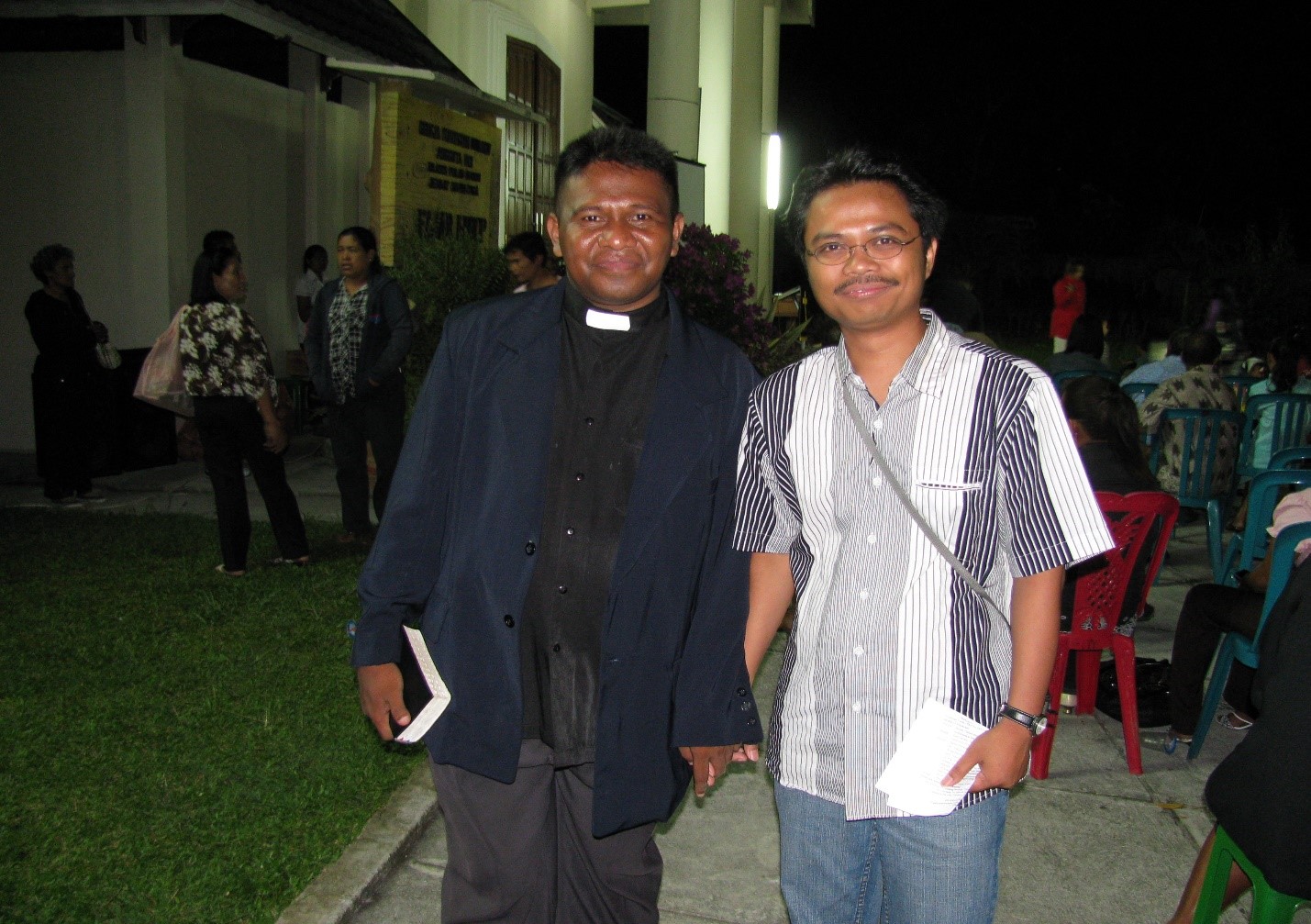Sumanto Al Qurtuby

VISITOR’S VOICE
Interview with Sumanto Al Qurtuby ❯❯
Cultural Anthropology ❘ Nusantara Institute
CSEAS Visiting Research Scholar: October to December 2025
WHAT ARE YOUR…?
FAVORITE THINGS
Watching movies (especially action and comedy movies) during breaks, nights, or weekends. To me, watching a movie not only entertains my brain, but also can refresh and inspire, including new ideas and methods.
Tranquility and cleanliness are also important for me. It is difficult for me to work or focus on my work if the surrounding areas are not peaceful and clean.
DO YOU HAVE…?
MUST HAVE GEAR for FIELD RESEARCH and WRITING
To me, folk music is essential. It helps me focus on work, concentrate my mind, and prevent stress and burnout. Places surrounded by plants and flowers also help create a peaceful mind that can eventually stimulate and cultivate my work. Finally, I like drinking coffee, which can energize my mind.
Interview
The Need for Interreligious Collaboration for Global Peace
01
Please tell us about your research.
My current research at CSEAS focuses on the polemics and contestation among Indonesian Muslim and Christian groups concerning Jewish communities, Judaism, and the Israeli-Palestinian (Hamas) conflict. I found this topic interesting because, although Islam and Christianity come from the same Semitic tradition as Judaism and there are many similarities among the religious doctrines, texts, narratives, discourses, and so on, among Muslim and Christian communities in Indonesia, views of Jews, Judaism, and the Israel-Palestinian/Hamas clashes differ from one group to another. Differences and contentions do not only occur between Muslim and Christian groups, but also within the same faith. I came to focus on this issue after observing debates and polemics on YouTube and other social media platforms such as Facebook.
02
Can you share with us an episode about any influential people, things, and places you have encountered whilst doing your research.
An important person who influenced my past research was Reverend Elifas Maspaitella, an Ambonese pastor, scholar, activist, and talented storyteller. He is an influential, humble, and smart person who I call “the walking dictionary.” No wonder he was selected as the Chairman of the Synod of the Moluccan Protestant Church. During my PhD research decades ago, I lived with him in a modest pastori, a house provided by local Christian communities for their pastors. During more than one year of my research, Reverend Maspaitella not only became my key resource person, but also my guide and “go-between” who introduced me to his extensive networks for interviews with a range of people, from “commonfolk” to high-rank bureaucrats, military commanders, and respected religious/political leaders. I learned a great deal from him about many things related to Maluku’s history, society, culture, and beliefs. He was truly instrumental in shaping and re-shaping my research, especially on themes related to Maluku/Ambon, eastern Indonesia.

03
How do you overcome the difficulties in putting together the results of your research into a research paper or book?
To me, the challenge is not putting together the outcomes of research into an academic work, but how to manage, allocate, and spend time to complete post-research work. In my case, I often force myself to get the job done by managing “work time” strictly. I usually wake up at 4 a.m. to start my work. Otherwise, it is difficult to finish many tasks.
04
Do you have any essential reads (books) that you recommend to younger people?
There are many essential books to read for younger people, but this depends on their interests. I cannot recommend “good books” because books that are considered good for some people are not for others. The most important thing for younger people, especially those interested in becoming teachers or scholars in the future, is to make reading academic books their habit. Once they like reading, they can dive into the deep ocean or fly high into the sky to explore mountains of fascinating books.
05
What are your future ambitions as a scholar?
Next year, after finishing my fellowship at CSEAS and after spending over 20 years abroad, I want to return home to my country Indonesia to contribute something to Indonesian society and academia. In addition to continue developing my non-university research institution, Nusantara Institute on Culture and Religion, I will join Satya Wacana Christian University, one of Indonesia’s oldest higher educational institutions and an esteemed Christian university, to help develop, advance, pluralize, and internationalize Master’s and doctorate programs in the Sociology of Religion as well as help initiate the founding of the Center for the Study of Religion and Christian-Muslim Relations.
06
What was the most difficult moment or challenge in your life, and how did you overcome it?
I came from a poor family. In addition to being a local religious cleric, my late father was a poor peasant. My mother is a petty trader in her village. For the poor, money is the most difficult thing. Our village is in an isolated place in the highlands of Central Java. During my childhood, to help my parents, I spent time in the jungle near the village to shepherd my goats. I did this after school, which is far away from my home village. Due to financial issues, I almost dropped out of school because we were unable to pay tuition and living expenses. To overcome this financial problem, I vowed to get scholarships by studying hard for my future higher education, and I made it. My university education, at institutions from Indonesia to the United States, was paid for by full scholarships.
07
Why did you choose CSEAS, or what is your expectation here?
CSEAS is a renowned and highly respected center for Southeast Asian studies. I think scholars or specialists in Southeast Asia from around the globe are eager to visit this center. I expect to engage with the center’s faculty members (not only with my counterpart, Professor Michael Feener) and fellows to discuss research projects, learn from them, and build academic connections with them.
(October 2024)
* The views expressed herein are those of the authors and do not necessarily reflect the views of the Center for Southeast Asian Studies, Kyoto University.
Sumanto Al Qurtuby is an Indonesian anthropologist and sociologist of religion, the Director of the Nusantara Institute, and a faculty member in the Faculty of Theology at Satya Wacana Christian University. Previously, Sumanto was a professor at King Fahd University of Petroleum & Minerals, a Senior Research Fellow at the National University of Singapore’s Middle East Institute, and a Research Fellow at the University of Notre Dame’s Kroc Institute for International Peace Studies. He received a PhD in Anthropology from Boston University. Although he has a deep interest in studying Islam and Muslim societies, his research extends beyond this faith and its adherents. In general, he is always interested in studying and researching the impact (positive or negative) of world religions and local beliefs on societies and the influence of societies on religious discourses and practices. Sumanto has written over 30 research articles published in multiple academic journals as well as authored and edited more than 40 books (in English and Indonesian), including Terrorism and Counter-terrorism in Saudi Arabia and Indonesia (Palgrave, 2022), Saudi Arabia and Indonesian Networks: Migration, Education, and Islam (Bloomsbury, 2019), and Religious Violence and Conciliation in Indonesia: Christians and Muslims in the Moluccas (Routledge, 2016).
Visitor’s Voiceは、CSEASに滞在しているフェローを紹介するインタビューシリーズです。彼らの研究活動にスポットを当てながら、研究の背景にある人々やさまざまなエピソードを含めて、一問一答形式で紹介しています。
